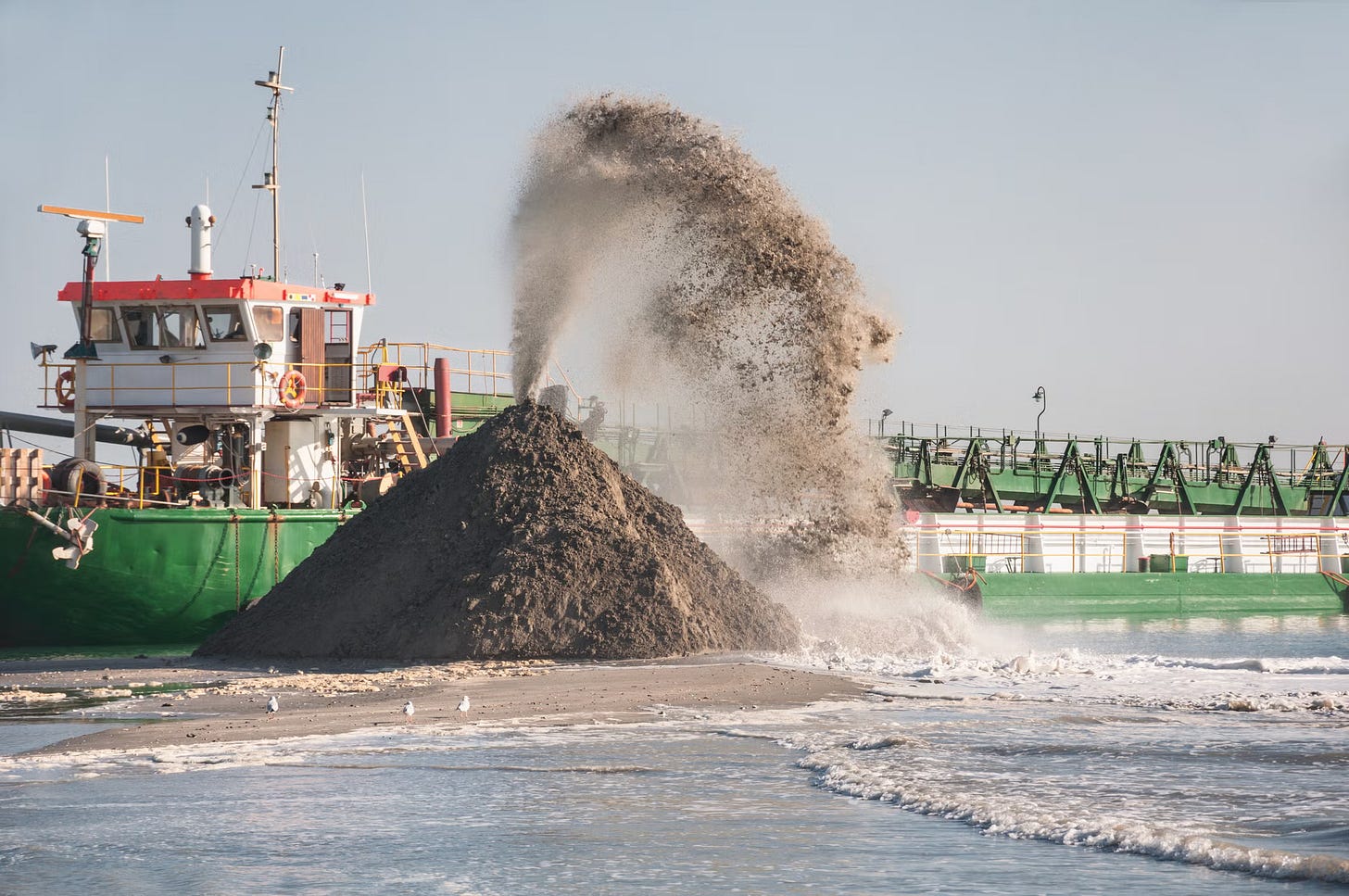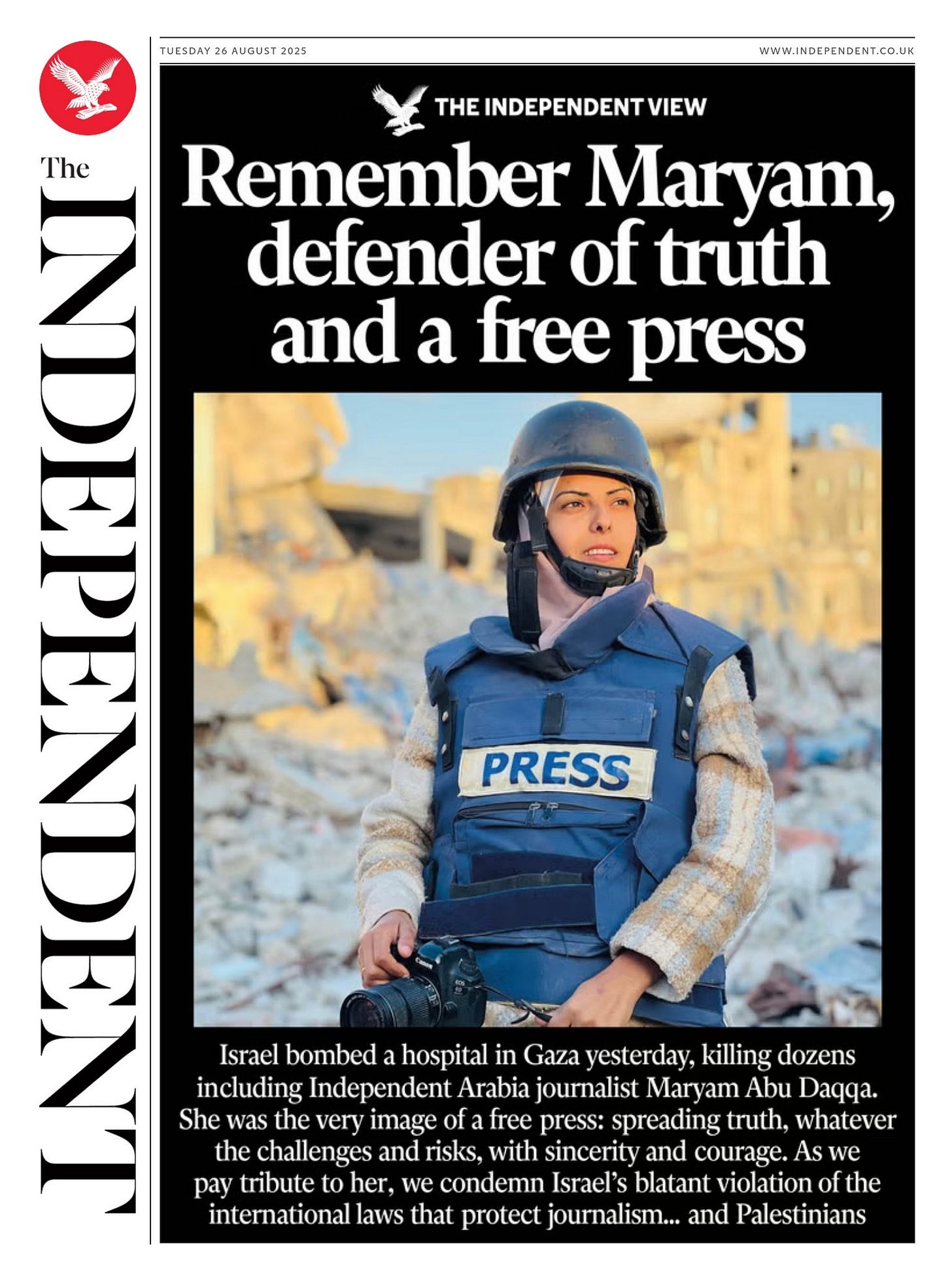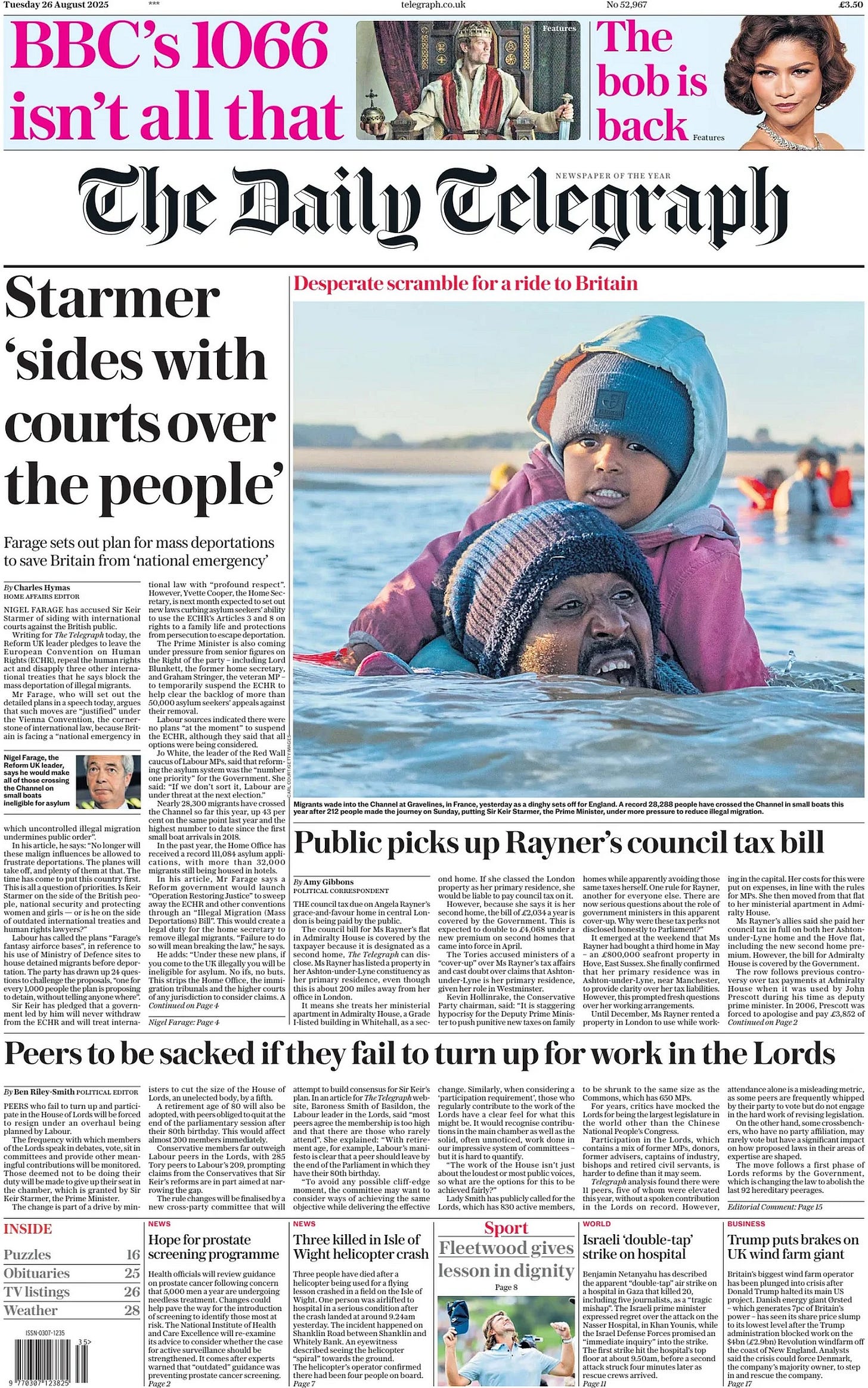🌍 Sand Wars: From the South China Sea to the Mekong, a Battle Over the World’s Most Exploited Resource
Vietnam’s island-building blitz alarms Beijing, but beneath the waves a deeper struggle looms — unsustainable sand dredging threatens ecosystems, food security, and the livelihoods of millions.
Beijing has vowed to defend its maritime rights in response to a US report that Vietnam has sped up its island-building efforts in the contested Spratly Islands this year. The Asia Maritime Transparency Initiative (AMTI) said Vietnam had ramped up construction on multiple reefs in 2025. Responding to the report on Monday, Chinese foreign ministry spokesman Guo Jiakun said the islands “are China’s inherent territory”. The Spratlys, known as the Nansha Islands in China, are claimed by various countries, including Vietnam and China, and are a flashpoint in the South China Sea, one of the world’s busiest trade routes. According to the report, since the start of this year Vietnam has expanded its island-building to eight features previously untouched by its current reclamation programme, which began in 2021. New dredging and landfill work has transformed small outposts into expanded artificial islands. With these additions, all 21 of Vietnam’s occupied rocks and low-tide elevations now include artificial land, compared with just 11 in 2021. As of March 2025, Vietnam had created about 70 per cent as much artificial land in the Spratly Islands as China had, AMTI said. “Reclamation at these eight new features all but ensures that Vietnam will match – and likely surpass – the scale of Beijing’s island-building,” the report said - SCMP
Around six billion tonnes of sand are dredged from the world’s ocean floor every year, according to data from the UN. According to the Centre for Analytics within the UN Environment Programme (UNEP), sand is the most exploited natural resource globally after water. Sand is used to produce concrete, glass and technology such as solar panels. The Marine Sand Watch data shows that the rate of dredging is growing and approaching the natural replenishment rate of 10–16 billion tonnes. The group estimated in 2023 that around 50 billion tonnes of sand and gravel are used across the world annually, with six billion tonnes coming from the world’s oceans and seas (That’s way beyond estimated natural replenishment rates of 15 billion to 20 billion tonnes annually). Sand dredging can have significant impacts on biodiversity and coastal communities. In the face of rising sea levels and extreme weather such as storms, coastal communities will rely on sand to build coastal defences. Sufficient sand levels also support the offshore energy industry, including the construction of wind and wave turbines, according to the UNEP. It has called on the sand mining industry to consider sand a “strategic material” and to “engage in talks on how to improve dredging standards around the world”. It also recommended that sand dredging be banned in certain areas of protected coastline. Researchers found that in certain areas, sand dredging vessels act as a kind of vacuum cleaner, dredging sand along with numerous microorganisms that fish feed on. They also concluded that the South China Sea, the North Sea and the US East Coast are among the areas where the most dredging has occurred.
A UK team’s research on the Lower Mekong river reveals that sand mining is depleting sediment stocks at an alarming pace, causing riverbeds to lower and banks to erode. As sea levels rise and riverbeds are lowered due to sand mining in the Mekong delta, saltwater spreads further upstream into freshwater areas, according to researchers at the University of Southampton This threatens agricultural productivity in the “rice bowl” of south-east Asia. Sand mining also undermines the delicate balance of ecosystems like the Tonle Sap lake – a critical fish nursery and food source for millions. The Mekong river in Asia flows through six countries, supporting more than 60 million people. In Cambodia, sand mining has become a multi-million-dollar industry, driven by a construction boom fuelled by Chinese investment. Along the Mekong river, the team has documented sites of severe bank erosion using hi-tech equipment. “Although existing research focuses exclusively on the physical damage, sand mining also erodes cultural and communal ties. Rivers are not just sources of water and food. They can be spiritual and cultural anchors,” wrote Julian Leyland, a professor of physical geography. In Cambodia, traditional fishing practices and sacred sites are disappearing as rivers are stripped of their sediment. For communities that have lived alongside these waterways for generations, the loss is profound, severing connections to their heritage and identity. The loss of livelihoods is equally devastating. Fishers and farmers, once reliant on the river’s bounty, are seeing their incomes vanish - The Conversation
The Cambodian government denies that dredging is responsible for the erosion, claiming it stabilises riverbanks – a claim disputed by the University of Southampton team. “Strengthening cross-border governance and enforcing extraction limits are critical to addressing this crisis. But time is running out,” the team says. The global sand trade is valued at over US$2.3 billion (£1.8 billion) annually, with demand predicted to double by 2060. Much of this economic gain is concentrated in wealthy cities, while the costs are disproportionately borne by local communities in extraction regions. In many sand-rich areas, people face displacement as their riverbanks erode and homes collapse into the water. The high value and ease of sand extraction have led to the rise of illicit mining networks. In some areas, so-called “sand mafias” control extraction sites, using intimidation and violence to secure their dominance. The lack of legal oversight fosters corruption, with mining permits often being issued through opaque processes. That can further marginalise local communities.
There have been reports of resorts in Turkey using imported sand, notably the D-Resort in Göcek, which imported sand from the Egyptian desert to create its beach and an "artificial" or "imported" beach feel. While Turkey has many natural sandy beaches, this resort opted to import sand to offer a unique, Maldives-like experience in the Mediterranean region. “This unique sand is known for staying cool in the summer heat and not sticking to feet,’ says a travel magazine
Global lithium prices rose significantly after China’s Contemporary Amperex Technology Co. Limited (CATL), the world’s largest electric vehicle (EV) battery manufacturer, halted its mine operations in Yichun, Jiangxi province. CATL announced earlier this month that it has temporarily shut down its Jianxiawo lithium mines in Yichun, known widely as “Asia’s lithium capital.” The suspension could last for at least three months, but may extend longer depending on the outcome of regulatory review processes. The announcement followed the company’s failure to renew an expired mining permit on August 9. CATL said it is addressing compliance requirements with government agencies - Asia Times
After his home was raided by the FBI last week, former national security advisor John Bolton unleashed a blistering critique of President Donald Trump’s Ukraine policy, claiming it is marked by "confusion, haste and disarray." “Collapsing in confusion, haste, and the absence of any discernible meeting of the minds among Ukraine, Russia, several European countries, and America, Trump’s negotiations may be in their last throes, along with his Nobel Peace Prize campaign," Bolton wrote in an op-ed published in the Washington Examiner days after federal agents carried out search warrants on his home and office. Bolton said Trump’s attempt to fast-track a peace deal was "inevitably" doomed, arguing the Alaska summit with Putin on Aug. 15 was arranged at a pace "almost surely unprecedented in modern history." He blasted Trump’s abrupt reversal after the meeting — backing off new sanctions on Moscow and scrapping demands for a ceasefire in favor of a "final agreement" — as proof of chaotic diplomacy. The former U.N. ambassador also pointed to contradictions inside the administration, noting Trump told Ukraine it must strike inside Russia even as the Pentagon blocked Kyiv from doing so. The Wall Street Journal reported on Saturday the Pentagon had been blocking long-range Army Tactical Missile Systems, or ATACMs, from reaching Ukraine. Meanwhile, allies such as India, Bolton wrote, were left "hanging out to dry" under new 50% U.S. tariffs while Russia and China skated free. "His efforts over the last two-plus weeks may have left us further from peace and a just settlement for Ukraine than before," Bolton concluded. Bolton even went after Trump for releasing a photo of himself pointing his finger at Putin’s chest, drawing comparisons to then-Vice President Richard Nixon’s finger-pointing during the famous kitchen debate with former Soviet Union prime minister Nikita Khrushchev. “Why Trump wants to be compared to the only president who resigned in disgrace is unclear." - Fox News
“Collapsing in confusion, haste, and the absence of any discernible meeting of the minds among Ukraine, Russia, several European countries, and America, Trump’s negotiations may be in their last throes, along with his Nobel Peace Prize campaign…Of course, it’s never over until it’s over, especially with Trump. But his efforts over the last two-plus weeks may have left us further from peace and a just settlement for Ukraine than before” - Ambassador John Bolton
Watch my interview from early this morning on BBC World Television, where I discuss the chaotic efforts by Donald Trump to end the war in Ukraine.
Canadian photojournalist Valerie Zink has resigned after eight years with Reuters, criticizing the news agency’s stance on Gaza as a "betrayal of journalists" and accusing it of "justifying and enabling" the killing of 245 journalists in the Palestinian enclave. “At this point it's become impossible for me to maintain a relationship with Reuters given its role in justifying and enabling the systematic assassination of 245 journalists in Gaza,” Zink said Tuesday through the US social media company X. Zink said she worked as a Reuters stringer for eight years, with her photos published by many outlets, including The New York Times, Al Jazeera, and others worldwide. She criticized Reuters’ reporting after the killing of Anas Al-Sharif and an Al Jazeera crew in Gaza, accusing the agency of amplifying Israel’s “entirely baseless claim” that Al-Sharif was a Hamas operative, which was “one of countless lies that media outlets like Reuters have dutifully repeated and dignified,” she said. “I have valued the work that I brought to Reuters over the past eight years, but at this point I can’t conceive of wearing this press pass with anything but deep shame and grief,” Zink said. She also emphasized that the agency’s willingness to “perpetuate Israel's propaganda” has not spared their own reporters from Israel's genocide. Referring to the killing of six more journalists, including Reuters cameraman Hossam Al-Masri, in Israel's Monday attack on the Nasser hospital in Gaza, Zink said: “It was what's known as a "double tap" strike, in which Israel bombs a civilian target like a school or hospital; waits for medics, rescue teams, and journalists to arrive; and then strikes again.” The new fatalities among the media personnel in Gaza brought the number of Palestinian journalists killed in Israeli attacks since October 2023 to 246. Israel has killed more than 62,700 Palestinians in Gaza since October 2023. The military campaign has devastated the enclave, which is facing famine - Anadolu
Turkey’s transport minister ended up with a speeding ticket after posting a video in which he was driving at excessive speed on a highway. Abdulkadir Uraloğlu shared footage on X late Sunday showing him behind the wheel on the Ankara-Niğde highway, listening to folk songs and clips of speeches by President Recep Tayyip Erdoğan, with the hashtag #TurkeyAccelerates. The video showed the minister’s speedometer hitting 225 kilometers per hour, well over Turkey’s 140 km/h limit. Within hours, Uraloğlu reposted the clip, admitting he had “effectively denounced” himself. “I unintentionally exceeded the speed limit for a short period,” he wrote, adding that authorities had fined him 9,267 lira (around €190). The incident drew widespread attention online, with critics questioning the minister’s judgment. One social media user asked: “Dear Minister, I am genuinely curious. Is there not even a single person in your team who would say, ‘Dear Minister, it appears you exceeded the speed limit in this video; sharing it could cause problems?'” Uraloğlu also posted a copy of the speeding ticket and insisted he would be “much more careful” in the future, stressing that “sticking to the speed limit is mandatory for everyone.” - Politico





